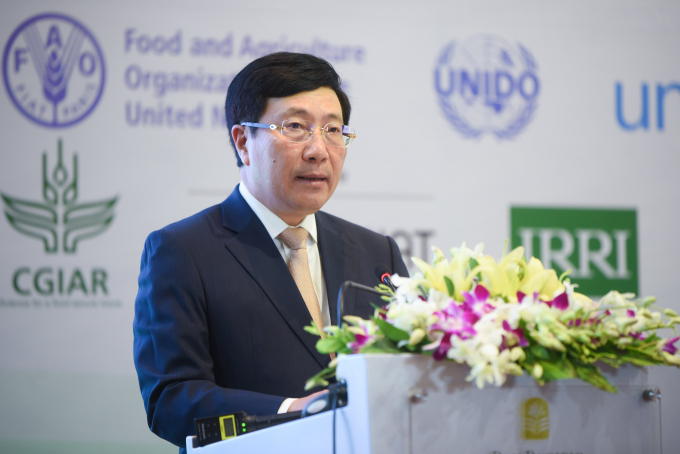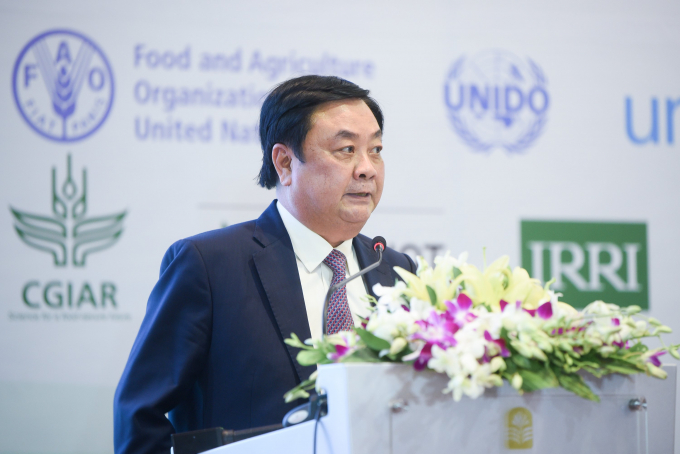June 14, 2025 | 17:09 GMT +7
June 14, 2025 | 17:09 GMT +7
Hotline: 0913.378.918
June 14, 2025 | 17:09 GMT +7
Hotline: 0913.378.918
Following the First National Dialogue and the three Regional Dialogues in the North, Central Region, and Mekong Delta held in June and early July 2021, the Second National Dialogue on Vietnam Food Systems: Transparency-Responisbity- Sustainability was held in Hanoi on the morning of July 16.
The dialogue features the attendance of Deputy Prime Minister Pham Binh Minh, Minister of MARD Le Minh Hoan, the United Nations Resident Coordinator (UNRC) in Viet Nam Kamal Malhotra, and World Bank Country Director for Viet Nam, Carolyn Turk as well as the direct and virtual participation of hundreds of representatives of departments, agencies, and localities.
At the event discussed the results of the previous Dialogues, share the draft on the priorities and implementation roadmap for transforming the food systems in Viet Nam and cooperation, collaboration, and support in the implementation process towards building transparent, responsible, and sustainable food systems in Vietnam.

Deputy Prime Minister Pham Binh Minh gave remarks at the Second National Dialogue on Vietnam Food Systems. Photo: Tung Dinh.
Vietnam's agriculture plays a particularly important role in ensuring food security, social stability, and livelihoods for over 60% of the population living in the rural areas, and contributes 14.85% of the country's GDP (2020). Despite the impacts of the COVID-19 pandemic, as well as the global climate change and natural disasters, Vietnam's agriculture still maintained a growth rate of 2.68% in 2020. The export turnover of agricultural, fish, and forest products hit USD 41.53 billion in 2020 and 24.23 billion USD in the first half of 2021.
In his opening speech, Deputy Prime Minister Pham Binh Minh said: “The Government of Vietnam is fully aware of the need for close coordination among countries and actors in the food systems to create revolutionary, sustainable and extensive changes of the whole systems.”
At the event, Deputy Prime Minister proposed some contents that Vietnam wants to promote cooperation with stakeholders including cooperation to accelerate the fight against Covid-19 and commit to working closely for post-pandemic recovery; building a Food System-based approach; developing and update the national nutritional balance sheet; communicating the green and sustainable consumption; strengthening coordination and information sharing in sustainable management of natural resources and researching and apply a multi-sectoral approach to relevant policies and programs.
Concluding the event, Minister of MARD Le Minh Hoan said that the opinions and thoughts of the representatives may greatly contribute to the building of Strategy for agriculture and rural development in the period of 2021-2030 of the ministry.

Minister of Agriculture and Rural Development Le Minh Hoan hailed all ideas and thoughts raising at the Dialogue. Photo: Tung Dinh.
According to the Minister, Vietnam's food system is coping with series of challenges including flooding, drought, salinity, pests among others causing huge losses. Despite the growth momentum in food productivity and production, it is time to take into account the social ties in the environment resources crisis attached by food quality, safety, and sanity. Lack of connectivity leading to low quality and added value, inequality in benefits, and responsibility distribution…
In this situation, Vietnam needs to concretize actions to promote cooperation, adding more supportive resources to form and promote the smart food system adapting to climate changes and towards sustainable goals.
As Vietnam targets to be a food producer and provider nation, with the commitment of “transparency- responsibility- sustainability”, MARD will put priority on the implementation of some main tasks.
Accordingly, Vietnam will move forward completing the policy and regulation system on land to encourage farmers to manage and use the land resources sustainably, aiming to develop a rural economy. Transforming from “agricultural production” to “agricultural economy”, promoting the image of responsible agriculture. Developing synchronous logistic infrastructure, facilities, and services to serve regional links and production-consumption connections.
Developing synchronous infrastructure, facilities in a logistic manner for regional linkages and production-consumption connections. To develop the food processing industry in association with raw material areas, to diversify products, increase added value and reduce loss and waste. Strengthening the international integration capacity of the food and food system. Exploiting the advantages of free trade agreements and international commitments. Participating in building a multilateral forum to facilitate global agricultural trade. Promoting digital transformation, developing the digital economy in agriculture.
On promoting linkages of national and international innovation networks, MARD is coordinating with the World Economic Forum to promote the Food Chain Innovation Network Initiative, joining in several initiatives and joint declarations in the world and regions such as “Renovating agriculture to tackle climate change”, “Develop sustainable food system for tropical monsoon regions” among others to move forward the green transformation of the economy as well as build up a low-carbon food system.
Building and updating the national balance nutritión table as a foundation to orient the production and distribution. Proposing a suitable approach to gradually form good and quality eating habits.
Supporting farmers at the village level to become a subject in the agricultural chain link, ensuring balance and harmony benefit of the effective public-private cooperation model.
Actively transform the food system towards green, ecological, circular, low-emissions, and sustainable agriculture.
As mentioned by Kamal Malhotra, Vietnam is a shining example in the story of poverty alleviation, Vietnam today can produce enough food for its 100 million population and the surplus production could well serve the same population in the world.
Over the past decade, Vietnam has been a net exporter of many agricultural products and the Vietnamese food system has also faced major challenges such as nutrition, food safety, food obesity in urban areas, and malnutrition in rural areas, environmental degradation due to overexploitation of natural resources, overuse of chemicals, limitations in production, and processing, logistics, among others leading to disadvantages in the competitiveness of Vietnam.
The UN Food System Summit is an opportunity for Vietnam - as a member of the United Nations to join in various dialogues regarding food system transformation. “Thus, it is necessary to have a strategic vision to lead an innovative transformation in the food system towards a healthy diet for children, raise awareness, make a commitment to take collective action among stakeholders to ensure that actors in the supply chain including governments at all levels, farmers, households, cooperatives, private sector, development partners, etc., participate in the agricultural sector. From there, Vietnam can contribute ideas and ideas to identify solutions, actions, and indicators to ensure participation in the strong transformation of the global food system.”, said Kamal Malhotra, UNRC representative in Vietnam.

World Bank Country Director for Vietnam Carolyn Turk. Photo: Tung Dinh.
Speaking at the conference, Carolyn Turk, hailed Vietnam's success in maintaining a positive growth pace of the agriculture field, which has contributed to poverty and hunger eradication, ensure food safety as well as malnutrition reduction. She cited Vietnam’s increasing competitive capacity in the export market with total agricultural exports over the past six months reaching USD 41 billion despite the hardships caused by climate change and the Covid-19 pandemic.
However, she cited four challenges that Vietnam should pay more attention to and promote cooperation with the World Bank to handle including climate change and greenhouse gasses emission; climate change adaption; food safety, and demographic structure.
Sharing with VAN on the bilateral cooperation opportunities between the United States and Vietnam in this agriculture field, Sarah Gilleski, Agricultural Attaché, US Embassy in Vietnam said that As a member of the UN, the US is very supportive of the UN’s Food System Summit. The US side is very appreciative that Vietnam holds this National Dialogue and allows stakeholders to share their thoughts on creating sustainable, transparent, and responsible agriculture.
“The one that we are looking for is to work with Vietnam on special trends and changes in Agriculture Innovation Mission for Climate. This is a new initiative that the US and UAE want to share, for innovation along with the preserved environment and agriculture to mitigate and adapt to climate change,” said Sarah.
The Dialouge is a significant event of Vietnam in the lead up to UN's Food System Summit.
UN's Food Systems Summit, which is slated to take place this September in New York (the US) orients more sustainable, more comprehensive, and more resistant development of the agricultural system, creating multi-lateral effects to achieve the sustainable development goals by 2030.
The summit focuses on five action goals including ensuring the right to approach safe foods and nutritions balance for all people; transform the consumption trend towards health and sustainability; promote environment-friendly production; promote equality in sharing value and livelihoods and built up the resistant capacity against shocks and vulnerability.

(VAN) The working delegation from the Ministry of Agriculture and Environment conducted an important trip to the Netherlands to strengthen strategic partnerships and sustainable development in the agricultural sector.

(VAN) The letter ‘A Plea from the Ocean’ not only evokes emotion but also awakens the human conscience to the responsibility of protecting life on Earth.

(VAN) The Department of Agriculture in South Africa has announced the country’s first mass vaccination of poultry to prevent local birds from contracting avian influenza.

(VAN) Establishment of the Mekong Delta Regional Agricultural Linkage Center, aiming for a closed value chain, deep processing, trading platforms, and international market connectivity.

(VAN) Gia Lai province has recently recorded 460 rare species of animals and plants, contributing to forest conservation and biodiversity planning in the region.

(VAN) Ms. Caroline Beresford, New Zealand Ambassador to Vietnam, expressed confidence that agricultural cooperation between Vietnam and New Zealand will develop sustainably, be climate-resilient, and promote gender equality.

(VAN) Vietnam reaffirms its commitment to international cooperation in fostering sustainable and responsible fisheries while ensuring resilient livelihoods for small-scale fishing communities.